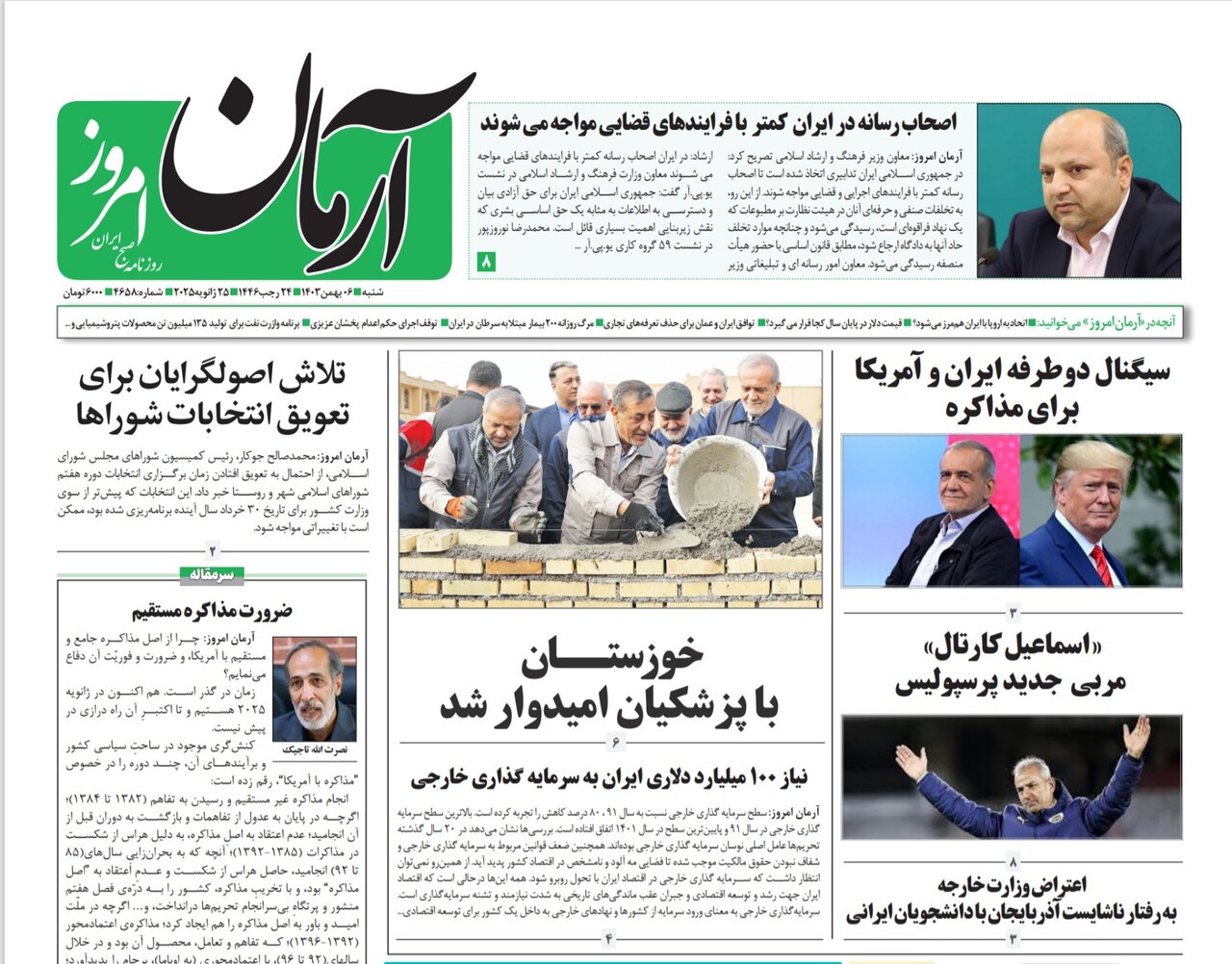New Middle East or Trump's ideal?

TEHRAN - In a commentary, Arman-e-Emrooz dealt with Trump's policy towards Tehran and wrote: Now that Trump has returned to power, everyone is waiting to see what policy he will adopt towards Iran.
Trump has not announced his policy towards Iran yet. Apparently, it seems he is not looking for war. But at the same time, he wants peace with his own standards and from a position of power. He may make a military threat, but it is unlikely that he will start a war unless he is sure beforehand that it will be one-sided and will not cause major losses (to the U.S.) Trump's constant emphasis on avoiding war in the Middle East is that he is looking for diplomacy and an agreement with Iran; but what kind of agreement? It has been said that he is looking for an agreement beyond the JCPOA with a focus on the nuclear issue, in which he will gain some concessions. In general, direct negotiations - secret or open - will most likely begin sooner or later. In the world of politics, it is not unlikely that we would eventually witness unexpected and surprising white smoke in negotiations.
Hamshahri: Trump's comments on Iran
In a note, Hamshahri addressed Trump's latest statements about Tehran. It wrote: U.S. President Donald Trump made threatening and anti-Iran statements on Thursday evening, stating that it would be great if issues were resolved with Iran without Israel attacking Iranian nuclear facilities. His statements come after media speculation about the appointment of Steve Witkoff, Trump's special envoy for the Middle East, to lead efforts on Iran. According to Israeli journalist Barak Ravid, the U.S. President's possible decision to appoint Witkoff as special envoy is a sign of his desire to engage diplomatically with Iran and reach a new nuclear agreement with Iran. On the other hand, the U.S. President's threatening statements against Iran come at a time when Iranian officials, while expressing their readiness for diplomacy, have warned against any military or belligerent action against Iran.
Sobh-e-No: Focusing too much on talks not advisable
In an analysis, Sobh-e-No newspaper discussed possible direct negotiations with the United States and its psychological impact on society. The paper said: In recent weeks, the issue of direct negotiations with the United States has been raised again in the statements of some politicians. Previous experiences have shown that Trump is not only untrustworthy but has always used agreements as a tool for further pressure. One thing to consider is the effect of these statements on public opinion. Promoting negotiations as a definitive solution can create unrealistic expectations among the people. But when these negotiations do not reach the desired result or fail, it intensifies people's disappointment. Focusing too much on this option is not only not useful, but can also have negative economic and social consequences. Solving Iran's problems requires relying on domestic power, reforming defective structures, and neutralizing sanctions through long-term strategies, not eying on negotiations whose past experiences have proven futile.
Javan: Opportunities in the Afghan economic market
In an article, Javan discussed the upcoming visit of the Foreign Minister of the Islamic Republic of Iran to Kabul and wrote: Surely the Afghan economic market provides a huge potential for the Iranian private and public sector. Afghanistan is a country of opportunities, and this great potential and capacity should not be neglected. While various economic delegations from Asian and European countries have been seeking to benefit from the Afghan market, why should Iran, as a neighbor that has the most in common with Afghanistan, remain deprived of this market?! It is expected that Arachis’s visit to Kabul would mark a serious and effective step towards implementing and pursuing economic agreements, and lead to active involvement of private and public sector in the Afghan economic market with a win-win outcome for the two brotherly and Muslim nations.
Leave a Comment